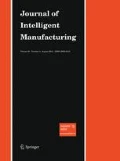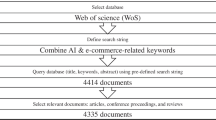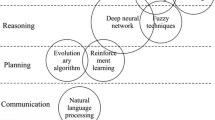Abstract
Electronic markets and web-based content have improved traditional product development processes by increasing the participation of customers and applying various recommender systems to satisfy individual customer needs. Agent-based systems based on agents’ roles and tasks can provide appropriate tools to solve product design problems by recommending design knowledge and information. This paper introduces an agent-based recommender system to support designing families of products based on customers’ preferences in dynamic electronic market environments. In the proposed system, a market-based learning mechanism is applied to determine the customers’ preferences for recommending appropriate products to customers of the product family. We demonstrate the implementation of the proposed recommender system using a multi-agent framework. Through simulated experiments, we illustrate that the proposed recommender system can help determine the preference values of products for customized recommendation and market segment design in various electronic market environments.
Similar content being viewed by others
References
Anumba C.J., Ren Z., Thorpe A., Ugwu O.O., Newnham L. (2003) Negotiation within a multi-agent system for the collaborative design of light industrial buildings. Advances in Engineering Software 34(7): 389–401. doi:10.1016/S0965-9978(03)00038-3
Bakos J.Y. (1997) Reducing buyer search costs: Implications for electronic marketplaces. Management Science 43(12): 1676–1692
Blecker T., Friedrich G., Kaluza B., Abdelkafi N., Kreutler G. (2005) Information and management systems for product customization. Springer Science Business Media Inc, New York
Chandra C., Kamrani A.K. (2003) Knowledge management for consumer-focused product design. Journal of Intelligent Manufacturing 14(6): 557–580. doi:10.1023/A:1027358721819
Chira O., Chira C., Roche T., Tormey D., Brennan A. (2006) An agent-based approach to knowledge management in distributed design. Journal of Intelligent Manufacturing 17(6): 737–750. doi:10.1007/s10845-006-0042-0
Ezzedine H., Kolski C., Peninou A. (2005) Agent-oriented design of human-computer interface: Application to supervision of an urban transport network. Engineering Applications of Artificial Intelligence 18(3): 255–270. doi:10.1016/j.engappai.2004.09.013
Jia H.Z., Ong S.K., Fuh J.Y.H., Zhang Y.F., Nee A.Y.C. (2004) An adaptive and upgradeable agent-based system for coordinated product development and manufacture. Robotics and Computer Integrated Manufacturing 20(2): 79–90. doi:10.1016/j.rcim.2003.08.001
Lee Y.H., Kumara S.R.T., Chatterjee K. (2003) Multiagent based dynamic resource scheduling for distributed multiple projects using a market mechanism. Journal of Intelligent Manufacturing 14(5): 471–484. doi:10.1023/A:1025753309346
Liang W.Y., Huang C.C. (2002) The agent-based collaboration information system of product development. International Journal of Information Management 22(3): 211–224. doi:10.1016/S0268-4012(02)00006-3
Madhusudan T. (2005) An agent-based approach for coordinating product design workflows. Computers in Industry 56(3): 235–259. doi:10.1016/j.compind.2004.12.003
Meyer M.H., Lehnerd A.P. (1997) The power of product platforms: Building value and cost leadership. The Free Press, New York
Monticino M., Acevedo M., Callicott B., Cogdill T., Lindquist C. (2007) Coupled human and natural systems: A multi-agent-based approach. Environmental Modelling & Software 22(5): 656–663. doi:10.1016/j.envsoft.2005.12.017
Moon S.K., Park J., Simpson T.W., Kumara S.R.T. (2008) A dynamic multi-agent system based on a negotiation mechanism for product family design. IEEE Transactions on Automation Science and Engineering 5(2): 234–244. doi:10.1109/TASE.2007.896902
Padovan B., Sackmann S., Eymann T., Pippow I. (2002) A prototype for an agent-based secure electronic marketplace including reputation-tracking mechanisms. International Journal of Electronic Commerce 6(4): 93–113
Rai R., Allada V. (2003) Modular product family design: Agent-based Pareto-optimization and quality loss function-based post-optimal analysis. International Journal of Production Research 41(17): 4075–4098. doi:10.1080/0020754031000149248
Shen W., Norrie D.H., Barthès J.A. (2001) Multi-agent systems for concurrent intelligent design and manufacturing. Taylor & Francis, New York
Shooter S.B., Simpson T.W., Kumara S.R.T., Stone R.B., Terpenny J.P. (2005) Toward an information management infrastructure for product family planning and platform customization. International Journal of Mass Customization 1(1): 134–155. doi:10.1504/IJMASSC.2005.007354
Silveria G.D., Borenstein D., Fogliatto F.S. (2001) Mass customization: Literature review and research directions. International Journal of Production Economics 72(1): 1–13. doi:10.1016/S0925-5273(00)00079-7
Simpson T.W., Siddique Z., Jiao J. (2005) Product platform and product family design: Methods and applications. Springer, New York
Tan G.W., Hayes C.C., Shaw M. (1996) An intelligent-agent framework for concurrent product design and planning. IEEE Transactions on Engineering Management 43(3): 297–306. doi:10.1109/17.511840
Tran T., Cohen R. (2002) A reputation-oriented reinforcement learning strategy for agents in electronic marketplaces. Computational Intelligence 18(4): 550–565. doi:10.1111/1467-8640.t01-1-00203
Wooldridge M. (2002) An introduction to mulitagent systems. Wiley, England
Yu, B., & Singh, M. P.(2000). A social mechanism for reputation management in electronic communities. In The 4th International Workshop on Cooperative Information (pp. 154–165). Berlin: Springer-Verlag.
Zacharia G., Evgeniou T., Moukas A., Boufounos P., Maes P. (2001) Economics of dynamic pricing in a reputation brokered agent mediated marketplace. Electronic Commerce Research 1(2): 85–100. doi:10.1023/A:1011523612549
Author information
Authors and Affiliations
Corresponding author
Rights and permissions
About this article
Cite this article
Moon, S.K., Simpson, T.W. & Kumara, S.R.T. An agent-based recommender system for developing customized families of products. J Intell Manuf 20, 649–659 (2009). https://doi.org/10.1007/s10845-008-0154-9
Received:
Accepted:
Published:
Issue Date:
DOI: https://doi.org/10.1007/s10845-008-0154-9




